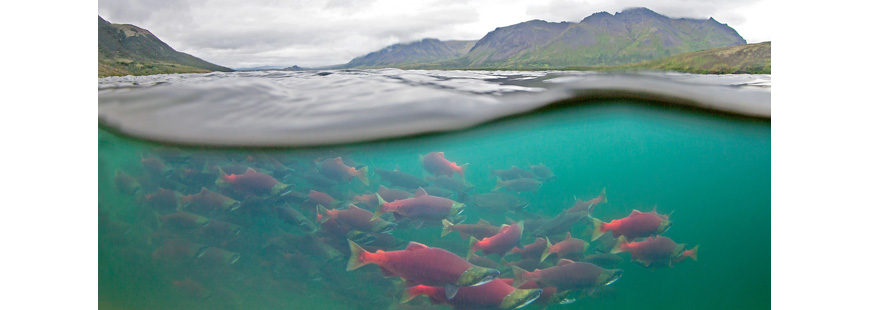Bristol Bay Update: The regional EPA office in Alaska (Region 10) is reviewing its Clean Water Act Section 404(c) actions. Read more below.
In September, Charles Witek, in his article, The Pendulum Swings for Bristol Bay, noted, “Right now, events seem to be coming full circle, with the balance again seeming to favor Bristol Bay and its salmon, although there is no telling when that may change, as it has changed so many times before.”
Witek does an excellent job of explaining the history and current situation with the Pebble Mine project and the use of the Clean Water Act’s section 404(c) protections.
The short version is the 404(c) protection process that had been underway before it was derailed by the Trump administration, has now begun again.
As explained in a news release from the Environmental Protection Agency:
The Clean Water Act generally requires a Section 404 permit from the U.S. Army Corps of Engineers to authorize a discharge of dredged or fill material into certain streams, wetlands, lakes and ponds. Section 404 directs EPA to develop the environmental criteria used to make permit decisions.
The U.S. Army Corps of Engineers authorizes thousands of Section 404 permits every year, and EPA works with the Corps and developers to resolve environmental concerns so projects can move forward. However, the Clean Water Act, in Section 404(c), also authorizes EPA to prohibit or restrict fill activities if EPA determines a discharge would have an unacceptable adverse effect on certain resources.
EPA has used its Section 404(c) authority sparingly, issuing final determinations only 13 times in the CWA’s 50-year history. The agency’s use of the authority has typically involved major projects with significant impacts on some of America’s most ecologically valuable waters.
The regional EPA office in Alaska (Region 10) is going through the process now and will issue a Recommended Determination to EPA headquarters this spring. EPA headquarters will then issue a Final Determination. The current thinking is that Final Determination could come in the summer of 2022. It is likely, but not definite, there will be at least one comment period to accompany these actions.
Meanwhile, Senator Lisa Murkowski (R-Alaska) has been looking at ways to legislate protections for Bristol Bay, although there are not a lot of details available at this point. A legislative approach could offer more durable protections than those afforded under a regulatory approach. Discussions continue on Capitol Hill, and those of us who seek protections are hopeful this approach will bear fruit.
Currently the courts have not looked with favor towards attempts to overturn final 404(c) determinations. For example, the Trump administration’s effort with Yazoo Pumps, which was vetoed under the Clean Water Action Section 404(c) in 2008 because the Yazoo Backwaters are key to Mississippi’s environmental health, failed.
While it seems like there has been good news of late, there is still work to be done. The President Biden and the EPA need to hear from people about the importance of protecting Bristol Bay before the next fishing season.
This new TV ad poignantly shares what is at stake in Bristol Bay.
Pebble Mine continues to be, in the immortal words of Alaska’s renowned Senator Ted Stevens, “the wrong mine in the wrong place.”
You can help to protect Bristol Bay. Click here to take action now.
Update
The regional EPA office in Alaska (Region 10) is reviewing its Clean Water Act Section 404(c) actions. On January 27, 2022, EPA Region 10 sent a letter to the Alaska District Corps of Engineers, the permit applicant, and others, stating that the agency intends to issue a revised Clean Water Act Section 404(c) Proposed Determination regarding the Pebble deposit area located in Alaska’s Bristol Bay watershed by May 31, 2022.
According to the EPA’s website:
EPA Region 10 continues to have reason to believe that the discharge of dredged or fill material associated with mining the Pebble deposit could result in unacceptable adverse effects on important fishery areas. Region 10 notified recipients of its intention to issue a revised Proposed Determination to ensure there is ample opportunity for full consideration of available information to determine next steps before May 31, 2022.
Read EPA’s Clean Water Act Section 404(c) Notification Letter [PDF]
While this action does offer more information on EPA’s intention and timing, it was met with concern by Tribes in the region. Alannah Hurley, Executive Director of the United Tribes of Bristol Bay, released the following statement:
“We are deeply disappointed that after months of outreach to EPA officials requesting robust Tribal consultation on the process moving forward, EPA’s announcement today further delayed the years-long effort to protect Bristol Bay without hearing our input. The Biden administration and the EPA have committed to consult Tribes in their decision-making process, but this should have taken place before today’s announcement. Now, at least one more fishing season could be imperiled by uncertainty.
Not only does this move delay long-overdue and urgently needed protections, it also flies in the face of Administrator Regan’s stated commitment to environmental justice, which he recently touted on his Journey to Justice Tour,” said Hurley. “Our Tribes deserve better. The EPA must provide Tribes, fishermen, and communities in the region the certainty that their way of life, cultural and spiritual identity, and the local economies are protected. That means, first and foremost, upholding their trust responsibility to the Tribes of Bristol Bay. EPA can and must work quickly to get back on track, the science is clear and they must finalize protections for our region. As the EPA’s process moves forward, EPA must advance a science-based and transparent process that includes true Tribal consultation and opportunities for public input. We hope the agency will clarify this timeline so that we can finally achieve permanent protections for Bristol Bay, our Tribes, and way of life as soon as this summer.”
Top photo: Bristol Bay sockeye salmon, via Earthjustice and courtesy Of Fish Eye Guy Photography


